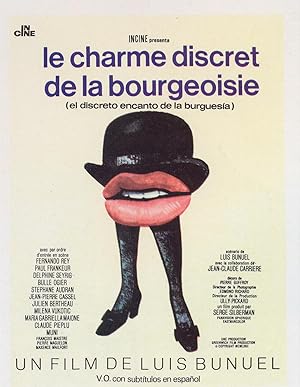
The Discreet Charm of the Bourgeoisie Page #6
- PG
- Year:
- 1972
- 102 min
- 1,531 Views
That's very interesting.
- Please.
Pass me Rafael's plate.
Pisces-Sagittarius...
enhances your strength
of character.
You try to exceed
the limits of your ego.
You think so?
Some lima beans?
- Especially with olive oil.
- I added some.
Just for me.
With pleasure.
Your lamb is superb.
- Not overdone?
- Just right.
You enjoy throwing
yourself into life.
You feel driven by great ideals
and noble undertakings.
Your open mind gives you
a global outlook on life.
You'll be my guests, next time.
Wait until you taste my caviar.
Florence will serve her
specialty:
vodka and aquavit.Your sensibility is in harmony with
your humanitarian conscience.
But if you want
to discard preconceptions,
you must replace them with a
personal code of ethics, Rafael.
I've always done as
my conscience dictates.
- Some more lamb, Rafael?
- With pleasure.
- You prefer it rare?
- I don't care.
It's delicious.
I may be a bit perverse,
but I've a weakness
Everybody, on your feet!
Ladies, on your feet!
- What's the meaning of this?
Get in the back!
Give us a chance to explain.
You've been misled.
In the back!
Move it!
When we've searched the house,
we'll have plenty
of time to talk.
What are you going to do?
Look!
Are you in pain, sir?
You screamed.
Do you need anything?
Nothing.
Go back to bed.
Translation
Translate and read this script in other languages:
Select another language:
- - Select -
- 简体中文 (Chinese - Simplified)
- 繁體中文 (Chinese - Traditional)
- Español (Spanish)
- Esperanto (Esperanto)
- 日本語 (Japanese)
- Português (Portuguese)
- Deutsch (German)
- العربية (Arabic)
- Français (French)
- Русский (Russian)
- ಕನ್ನಡ (Kannada)
- 한국어 (Korean)
- עברית (Hebrew)
- Gaeilge (Irish)
- Українська (Ukrainian)
- اردو (Urdu)
- Magyar (Hungarian)
- मानक हिन्दी (Hindi)
- Indonesia (Indonesian)
- Italiano (Italian)
- தமிழ் (Tamil)
- Türkçe (Turkish)
- తెలుగు (Telugu)
- ภาษาไทย (Thai)
- Tiếng Việt (Vietnamese)
- Čeština (Czech)
- Polski (Polish)
- Bahasa Indonesia (Indonesian)
- Românește (Romanian)
- Nederlands (Dutch)
- Ελληνικά (Greek)
- Latinum (Latin)
- Svenska (Swedish)
- Dansk (Danish)
- Suomi (Finnish)
- فارسی (Persian)
- ייִדיש (Yiddish)
- հայերեն (Armenian)
- Norsk (Norwegian)
- English (English)
Citation
Use the citation below to add this screenplay to your bibliography:
Style:MLAChicagoAPA
"The Discreet Charm of the Bourgeoisie" Scripts.com. STANDS4 LLC, 2025. Web. 23 Feb. 2025. <https://www.scripts.com/script/the_discreet_charm_of_the_bourgeoisie_5351>.






Discuss this script with the community:
Report Comment
We're doing our best to make sure our content is useful, accurate and safe.
If by any chance you spot an inappropriate comment while navigating through our website please use this form to let us know, and we'll take care of it shortly.
Attachment
You need to be logged in to favorite.
Log In